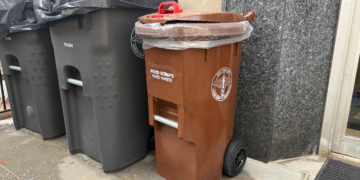
By Scott Etkin
Although composting has been mandatory for all residential buildings in New York City for the past six months, it’s now about to get real – really enforced, that is.
Beginning April 1, buildings can be fined for failing to comply with Curbside Composting, the NYC Department of Sanitation’s program to get food scraps (and yard waste, but there isn’t much of that on the UWS) off the street and out of landfills.
The program calls for buildings throughout the city to maintain brown bins where residents can deposit food waste (like banana peels and coffee grounds) and paper products (like paper towels and paper plates) that have been food-soiled.
Bins are then set out by the building’s staff on its recycling day to be collected by sanitation workers.
When those workers find a building is not complying, they can initiate enforcement by reporting it to their supervisor, who is responsible for following up. New Yorkers can also report noncompliance (or missed pickups) to 311. Notice of any fines issued would go to the property owner.
The fines for composting noncompliance are the same as the ones for failing to properly recycle metal, glass, plastic, and paper. For residential buildings with one to eight units the rates are: $25 for a first offense; $50 for a second offense; and $100 for a third offense and each subsequent offense.
The rates are higher for residential buildings with nine or more units: $100 for a first offense; $200 for a second offense; and $300 for a third offense and each one after that.
The point of the program is to “containerize” food scraps so that they can’t be a food source for rats, which have an easy time ripping open the plastic garbage bags that have traditionally been used for trash. There’s also an environmental benefit: The organic waste that’s collected is mostly used as an energy source, rather than decomposing in a landfill, which releases methane, a gas that warms the planet.

So far, there’s evidence suggesting that composting has been slow to catch on with New Yorkers. A study published by Baruch College found that less than 5% of New Yorkers’ organic waste in 2024 was being diverted from landfills, Gothamist reported in February. The city hopes to turn that around once fines begin to be levied. “Enforcement is a tool to encourage compliance with the law,” a DSNY spokesperson wrote in a message to the Rag.
In October 2024, the first official month of the Curbside Composting program, sanitation workers collected 129 tons of organic waste from street bins, schools, and residences across the Upper West Side’s Community Board 7 area, which covers West 59th to 110th streets. (One ton equals 2,000 pounds.)
Over the fall and into the new year, there are signs that the rate has picked up. From October 2024 through February this year, workers collected 817 tons of compost in the CB7 area, a 56% increase compared to the same period a year prior.
“We deliberately designed this program to be easy and, as a result, we are collecting record amounts of compost,” a DSNY spokesperson wrote in a message to the Rag. “It took years for New Yorkers to get used to separating metal, glass and plastic for recycling, and we understand that separating food and yard waste will also show a gradual rise in participation as residents become accustomed to doing this.”
- Read more: Why I Love Composting, Let Me Count the Ways
Subscribe to WSR’s free email newsletter here. And you can Support the Rag here.









“When those workers find a building is not complying, they can initiate enforcement by reporting it to their supervisor, who is responsible for following up.”
Define noncompliance please. Is it not putting out the compost bin? Is it having compostable things in the regular garbage? All of the above?
This is just another money grab by the city. It will be nearly impossible to fully comply.
How about the DSNY stop people letting their dogs crap and urinate all over the streets with no enforcement before moving on to this non issue. Just as there is no such thing as recycling plastic, there is no landfill shortage.
Bill Williams – most of us don’t think it’s nonsense. Better practices means fewer rodents. And even if there is no landfill shortage (veracity and implications of that statement a debate for another day) doesn’t mean the City should be paying to ship garbage elsewhere when it could save the money by composting it and reaping the green benefits in our parks and elsewhere.
He’s right. We have over 200 years of landfill capacity, and it’s very easy to increase that will all the empty land in the middle of nowhere. This just seems like an overstep. How are New Yorkers supposed to have so many different trash types with no space?
Um… it isn’t about landfill capacity. It is about methane gas released through anaerobic decomposition.
It is about cities being charged by the weight of their trash- organics make up a large part of the weight of our trash.
But mostly it is about methane.
Not complicated.
Read up on it if you are confused
Composting is basic and an old idea – a critical step to go back to.
You can do it!
You people are clowns with all this tech why don’t you update you waste management dumps to separate everything instead of trying to keep imposing more and more rules for you to just try to fine the people of new York .this became a the the communist city of New York
Have fun going through the garbage bag that I dumped down the chute three days ago and which my building compacted and put outside in a covered, wheeled dumpster.
They’ll just fine your building $, and your monthly HOA will go up. No one will be going through your trash. Checkmate!
All garbage needs to placed in covered cans and not bags thrown on the curb.
Does the compost participation rate include the smart bins that you need your phone to open? The one near my building is frequently full, which makes me think the participation rate is actually pretty good.
The idea is that eventually compost bins will replace parking spaces.
Ugh – any advice for those of us who may be renters in large buildings that have shown no sign of a brown bin or any announcement about composting since October? I love our building but am nervous to complain about something like this. On the one hand, it’s a huge undertaking for a building where I am sure even basic recycling compliance isn’t great. (They do do frequent pickups and have the 2 different bins for that.) On the other hand, the food scraps are the most important kind of garbage to promptly remove, to improve urban life, and composting is the best way to do it. In the meantime I patronize the orange box a few blocks away, but still…
Will the buildings be required to make composting as easily and accessible as other trash disposal? In my building you have to go to a dark damp and deserted basement space to bring your food waste. No way am I doing that. Other garbage and recyclables are handled on each individual floor.
Big buildings could end up with fines every week. There will always be someone who refuses to go along. Personally I keep a bag in the freezer and drop it off in the basement once a week. Happy to do anything to keep rats at bay
“Big buildings could end up with fines every week”.
I’m pretty sure that’s the government’s plan.
Makes me feel like we are well on our way to a prescient bit by Penn & Teller, way back in early 2000s, about recycling. (season 2, episode 5 of “Penn & Teller B.S.” if you’re googling it)
They laid out for a couple of unsuspecting citizens something like 9 bins for new categories such as:
– empty food cans “with paper labels”
– empty plastic containers that had “come in contact with food”
– printing paper, but only that which is “colored paper”
– toilet paper that was “slightly soiled”
Etc etc.
The people agreed to all of it lol.
And here we are, 20 years later.